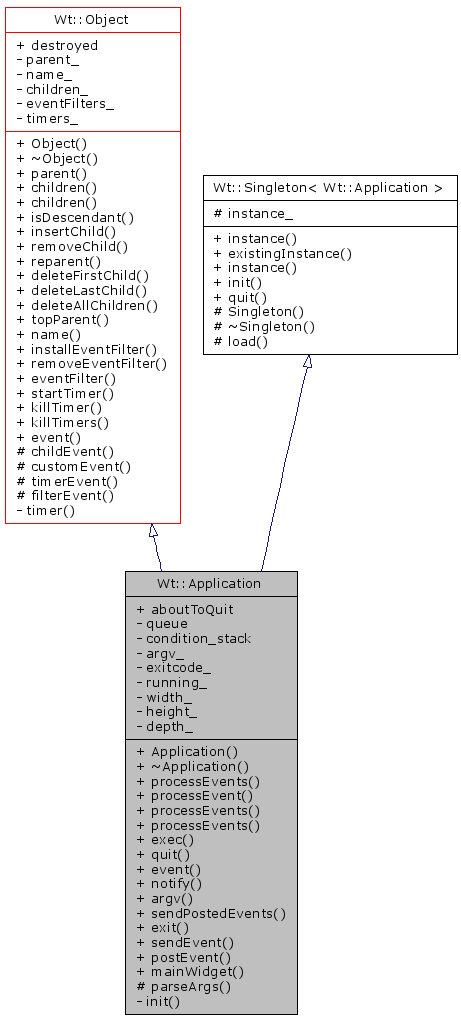
#include <application.h>
Inheritance diagram for Wt::Application:

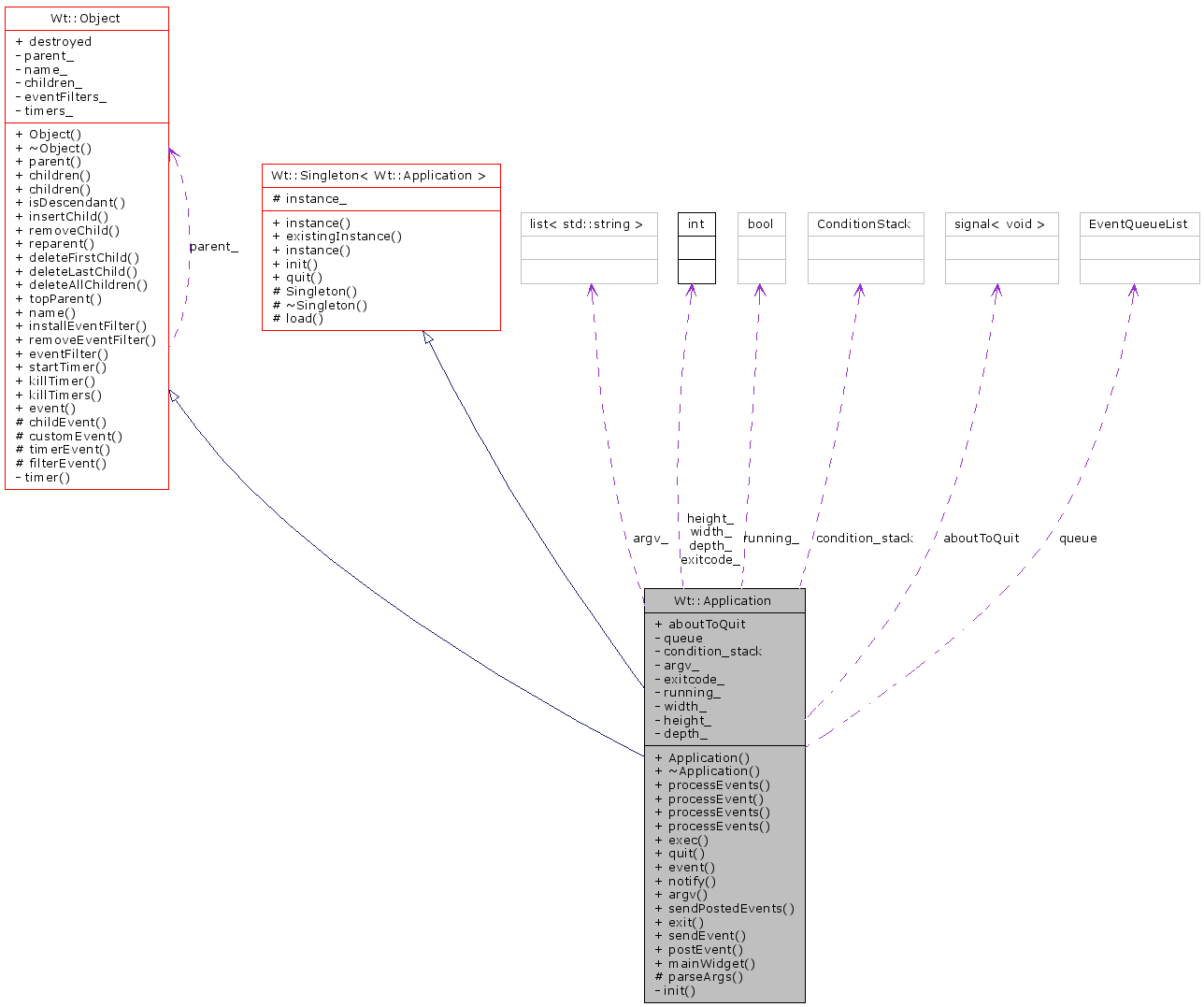
Public Types | |
| typedef std::list< Object * > | List |
Public Member Functions | |
| Application (int argc=0, char **argv=0) | |
| Constructor. | |
| virtual | ~Application () |
| Default destructor. | |
| void | processEvents (Condition *cond) |
| process all events until the condition is met | |
| void | processEvent () |
| process on event event if we have to wait for it | |
| void | processEvents (int ms=3000) |
| process all the events in the queue for a maximum period of time | |
| void | processEvents (const bool &var) |
| process all events while the var is true | |
| int | exec () |
| process all events so far until the end of the application | |
| void | quit () |
| Halt execution and close window. | |
| virtual bool | event (Event *e) |
| event handling | |
| virtual bool | notify (Object *receiver, Event *event) |
| std::list< std::string > & | argv () |
| Object * | parent () const |
| const List & | children () const |
| List & | children () |
| bool | isDescendant (const Object *p) const |
| virtual void | insertChild (Object *obj) |
| virtual void | removeChild (Object *obj) |
| void | reparent (Object *new_parent) |
| template<typename T> | |
| void | deleteFirstChild () |
| template<typename T> | |
| void | deleteLastChild () |
| template<typename T> | |
| void | deleteAllChildren () |
| Object * | topParent () const |
| returns top level parent: it may return itself | |
| const std::string & | name () const |
| void | installEventFilter (const Object *filterObj) |
| void | removeEventFilter (const Object *obj) |
| virtual bool | eventFilter (Object *, Event *) |
| int | startTimer (int interval) |
| void | killTimer (int id) |
| void | killTimers () |
Static Public Member Functions | |
| static void | sendPostedEvents () |
| process the already posted events -- empties the queue | |
| static void | exit (int exitcode=0) |
| Halt execution and close window with a return code. | |
| static bool | sendEvent (Object *receiver, Event &event) |
| static void | postEvent (Object *receiver, Event *event) |
| static Widget * | mainWidget () |
| static DERIVED * | instance () |
| template<class GRANDCHILD> | |
| static DERIVED * | instance () |
| instantiates the pointer compatible child of DERIVED aka grandchild | |
| static DERIVED * | existingInstance () |
Public Attributes | |
| sigc::signal< void > | aboutToQuit |
| Signal01< void, const Object * > | destroyed |
| signals | |
Protected Member Functions | |
| void | parseArgs (int argc, char **argv) |
| virtual void | childEvent (ChildEvent *) |
| event handling specialization | |
| virtual void | customEvent (CustomEvent *) |
| virtual void | timerEvent (TimerEvent *) |
| bool | filterEvent (Event *) |
Static Protected Member Functions | |
| static DERIVED * | load () |
| try to load the instance | |
Static Protected Attributes | |
| static DERIVED * | instance_ = 0 |
Private Types | |
| typedef std::list< EventQueueItem > | EventQueueList |
| typedef std::stack< Condition * > | ConditionStack |
Private Member Functions | |
| void | init () |
Private Attributes | |
| EventQueueList | queue |
| ConditionStack | condition_stack |
| std::list< std::string > | argv_ |
| int | exitcode_ |
| bool | running_ |
| int | width_ |
| int | height_ |
| int | depth_ |
Friends | |
| class | Singleton< Application > |
Classes | |
| class | Condition |
| class | EventQueueItem |
| class | Exception |
Extend this class to create your application.
Definition at line 41 of file application.h.
typedef std::stack<Condition *> Wt::Application::ConditionStack [private] |
Definition at line 112 of file application.h.
typedef std::list<EventQueueItem> Wt::Application::EventQueueList [private] |
Definition at line 110 of file application.h.
typedef std::list<Object*> Wt::Object::List [inherited] |
| Wt::Application::Application | ( | int | argc = 0, |
|
| char ** | argv = 0 | |||
| ) |
Constructor.
Definition at line 51 of file application.cpp.
References depth_, Error, height_, Wt::Font::init(), Wt::SDLTimer::init(), Wt::Singleton< DERIVED >::init(), parseArgs(), trace, and width_.
00052 : Object(0, "Application::anon"), 00053 Singleton<Application>(this), 00054 exitcode_(0), 00055 running_(true), 00056 width_(Display::defaultWidth), 00057 height_(Display::defaultHeight), 00058 depth_(Display::defaultDepth) { 00059 parseArgs(argc, argv); 00060 Uint32 sdl_flags = SDL_INIT_VIDEO | SDL_INIT_NOPARACHUTE | SDL_INIT_TIMER; 00061 00062 #if !defined( __WIN32__ ) && !defined( __CYGWIN32__ ) 00063 00064 sdl_flags |= SDL_INIT_EVENTTHREAD; 00065 #endif 00066 00067 /* Initialize SDL step by step*/ 00068 trace("app") << "trying to initialize SDLvideo ... " << std::endl; 00069 if ( SDL_Init(sdl_flags) < 0 ) { 00070 Error("Cannot initialize SDL\n"); 00071 throw Exception(); 00072 } 00073 00074 //init SDLEventHandler 00075 SDLEvent::init(); 00076 //init SDLInput 00077 SDLInput::init(); 00078 //init SDLTimers 00079 SDLTimer::init(); 00080 // initialize audio handling 00081 Audio::init(); 00082 // initialize font handling 00083 Font::init(); 00084 // initialize rootwindow 00085 new RootWindow(width_, height_, depth_); 00086 00087 //parseArgs(argc, argv, other_flags); 00088 00089 trace("app", "Enabling SDL Unicode support\n"); 00090 SDL_EnableUNICODE(1); 00091 00092 SDL_EnableKeyRepeat(SDL_DEFAULT_REPEAT_DELAY, SDL_DEFAULT_REPEAT_INTERVAL); 00093 }
Here is the call graph for this function:
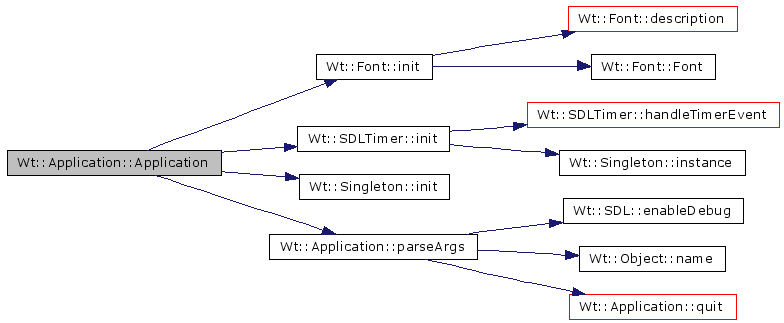
| Wt::Application::~Application | ( | ) | [virtual] |
Default destructor.
Definition at line 169 of file application.cpp.
References aboutToQuit, Wt::RootWindow::instance(), Wt::SDLTimer::quit(), Wt::Singleton< DERIVED >::quit(), Wt::Font::quit(), and trace.
00169 { 00170 trace("app") << "In application destructor" << std::endl; 00171 00172 aboutToQuit.emit(); 00173 00174 trace("app") << "Doing video shutdown" << std::endl; 00175 00176 delete RootWindow::instance(); 00177 00178 trace("app") << "Quitting SDL" << std::endl; 00179 00180 Font::quit(); 00181 Audio::quit(); 00182 SDLTimer::quit(); 00183 SDLInput::quit(); 00184 SDLEvent::quit(); 00185 // shut down video (to kill the window) before shutting down 00186 // audio, since audio shutdown takes _so_ long 00187 SDL_QuitSubSystem(SDL_INIT_VIDEO); 00188 SDL_Quit(); 00189 }
Here is the call graph for this function:
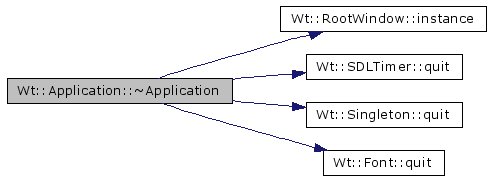
| std::list< std::string > & Wt::Application::argv | ( | ) |
| virtual void Wt::Object::childEvent | ( | ChildEvent * | ) | [inline, protected, virtual, inherited] |
event handling specialization
Reimplemented in Wt::Window::Frame.
Definition at line 146 of file object.h.
Referenced by Wt::Object::event().
| List& Wt::Object::children | ( | ) | [inline, inherited] |
Definition at line 61 of file object.h.
References Wt::Object::children_.
00061 { 00062 return children_; 00063 }
| const List& Wt::Object::children | ( | ) | const [inline, inherited] |
Definition at line 57 of file object.h.
References Wt::Object::children_.
Referenced by Wt::RootWindow::blit_region_ex(), Wt::Widget::childAt(), Wt::Object::deleteAllChildren(), Wt::Object::deleteFirstChild(), Wt::Object::deleteLastChild(), Wt::Widget::focusNextPrevChild(), Wt::Widget::fontChange(), Wt::Widget::lower(), Wt::postLayoutHintEventRecursively(), and Wt::Widget::raise().
00057 { 00058 return children_; 00059 }
| virtual void Wt::Object::customEvent | ( | CustomEvent * | ) | [inline, protected, virtual, inherited] |
| void Wt::Object::deleteAllChildren | ( | ) | [inline, inherited] |
Definition at line 106 of file object.h.
References Wt::Object::children().
00106 { 00107 List::iterator it(children().begin()); 00108 List::iterator end(children().end()); 00109 00110 while (it != end) { 00111 T *t = dynamic_cast<T *>(*it); 00112 // before iteration invalidation 00113 ++it; 00114 // this will invalidate the iterator 00115 if (t) { 00116 delete t; 00117 } 00118 } 00119 }
Here is the call graph for this function:

| void Wt::Object::deleteFirstChild | ( | ) | [inline, inherited] |
Definition at line 72 of file object.h.
References Wt::Object::children().
00072 { 00073 List::iterator it(children().begin()); 00074 List::iterator end(children().end()); 00075 00076 while (it != end) { 00077 T *t = dynamic_cast<T *>(*it); 00078 // before iteration invalidation 00079 ++it; 00080 // this will invalidate the iterator 00081 if (t) { 00082 delete t; 00083 break; 00084 } 00085 } 00086 }
Here is the call graph for this function:

| void Wt::Object::deleteLastChild | ( | ) | [inline, inherited] |
Definition at line 89 of file object.h.
References Wt::Object::children().
00089 { 00090 List::reverse_iterator it(children().rbegin()); 00091 List::reverse_iterator end(children().rend()); 00092 00093 while (it != end) { 00094 T *t = dynamic_cast<T *>(*it); 00095 // before iteration invalidation 00096 ++it; 00097 // this will invalidate the iterator 00098 if (t) { 00099 delete t; 00100 break; 00101 } 00102 } 00103 }
Here is the call graph for this function:

| bool Wt::Application::event | ( | Event * | e | ) | [virtual] |
event handling
Reimplemented from Wt::Object.
Definition at line 303 of file application.cpp.
References Wt::Object::filterEvent().
Referenced by notify(), postEvent(), and sendEvent().
00303 { 00304 return filterEvent(e); 00305 }
Here is the call graph for this function:

Reimplemented in Wt::Layout.
Definition at line 130 of file object.h.
Referenced by Wt::Layout::eventFilter().
| int Wt::Application::exec | ( | ) |
process all events so far until the end of the application
Definition at line 284 of file application.cpp.
References exitcode_, processEvents(), running_, and sendPostedEvents().
00284 { 00285 processEvents(running_); 00286 sendPostedEvents(); 00287 return exitcode_; 00288 }
Here is the call graph for this function:

| static DERIVED* Wt::Singleton< DERIVED >::existingInstance | ( | ) | [inline, static, inherited] |
Definition at line 36 of file singleton.h.
Referenced by exit(), postEvent(), sendEvent(), and sendPostedEvents().
00036 { 00037 return instance_; 00038 }
| void Wt::Application::exit | ( | int | exitcode = 0 |
) | [static] |
Halt execution and close window with a return code.
Definition at line 290 of file application.cpp.
References Wt::Singleton< DERIVED >::existingInstance(), exitcode_, running_, and trace.
Referenced by Wt::SDLInput::handleQuitEvent(), and quit().
00290 { 00291 Application *app = existingInstance(); 00292 if (!app) 00293 return; 00294 trace("app") << "Application: was requested to exit." << std::endl; 00295 app->running_ = false; 00296 app->exitcode_ = exitcode; 00297 }
Here is the call graph for this function:

| bool Wt::Object::filterEvent | ( | Event * | ) | [protected, inherited] |
Definition at line 164 of file object.cpp.
References Wt::Object::eventFilters_.
Referenced by Wt::Object::event(), and event().
00164 { 00165 for (List::iterator filter(eventFilters_.begin()), 00166 end(eventFilters_.end()); filter != end; ++filter) { 00167 if ((*filter)->eventFilter(this, e)) 00168 return true; 00169 } 00170 return false; 00171 }
| void Wt::Application::init | ( | ) | [private] |
| void Wt::Object::insertChild | ( | Object * | obj | ) | [virtual, inherited] |
Definition at line 81 of file object.cpp.
References Wt::Event::ChildInserted, Wt::Object::children_, Wt::Object::parent_, and postEvent().
Referenced by Wt::Object::Object(), and Wt::Object::reparent().
00081 { 00082 children_.push_back(obj); 00083 obj->parent_ = this; 00084 Event *child_event = new ChildEvent(Event::ChildInserted, obj); 00085 Application::postEvent(this, child_event); 00086 }
Here is the call graph for this function:
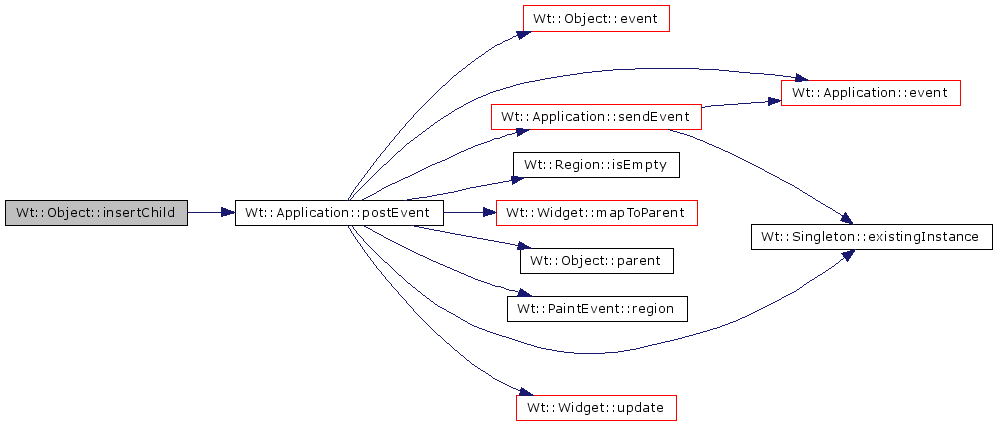
| void Wt::Object::installEventFilter | ( | const Object * | filterObj | ) | [inherited] |
Definition at line 124 of file object.cpp.
References Wt::Object::destroyed, Wt::Object::eventFilters_, and Wt::Object::removeEventFilter().
Referenced by Wt::Widget::setLayout().
00124 { 00125 // we have to deconstify here. We cannot deliver event to const objects 00126 Object *obj = const_cast<Object *>(filterObj); 00127 eventFilters_.push_back(obj); 00128 obj->destroyed.connect(sigc::slot1<void, const Object *>( 00129 sigc::mem_fun(*this, &Object::removeEventFilter))); 00130 }
Here is the call graph for this function:

| static DERIVED* Wt::Singleton< DERIVED >::instance | ( | ) | [inline, static, inherited] |
instantiates the pointer compatible child of DERIVED aka grandchild
it is handy in driver like situations
Definition at line 43 of file singleton.h.
| static DERIVED* Wt::Singleton< DERIVED >::instance | ( | ) | [inline, static, inherited] |
Definition at line 32 of file singleton.h.
Referenced by Wt::Audio::Audio(), Wt::Sound::available(), Wt::SDLMixer::Chunk::channel(), Wt::NullAudio::Chunk::channel(), Wt::SDLSurface::defaultDepth(), Wt::SDLInput::EventInfo::EventInfo(), Wt::Dialog::exec(), Wt::Widget::grabKeyboard(), Wt::Widget::grabMouse(), Wt::Audio::handleAudioEvent(), Wt::SDLInput::handleKeyEvent(), Wt::Singleton< Wt::Audio >::init(), Wt::SDLTimer::init(), Wt::Sound::isAvailable(), Wt::Widget::keyboardGrabber(), Wt::Audio::load(), Wt::Widget::mouseGrabber(), Wt::SDLMixer::onChannelFinish(), Wt::Audio::onChannelFinish(), Wt::Sound::play(), Wt::Singleton< Wt::Audio >::quit(), Wt::Widget::releaseKeyboard(), Wt::Widget::releaseMouse(), Wt::SDLInput::SDLInput(), Wt::SDLMixer::setMusicVolume(), Wt::SDLMixer::Channel::setVolume(), and Wt::SDLMixer::Chunk::setVolume().
| bool Wt::Object::isDescendant | ( | const Object * | p | ) | const [inherited] |
Definition at line 67 of file object.cpp.
References Wt::Object::parent().
Referenced by Wt::SDLInput::EventInfo::EventInfo(), and Wt::SDLInput::handleKeyEvent().
00067 { 00068 if (!p) 00069 return false; 00070 00071 const Object *q = this; 00072 00073 do { 00074 if (p == q) 00075 return true; 00076 } while ((q = q->parent())); 00077 00078 return false; 00079 }
Here is the call graph for this function:

| void Wt::Object::killTimer | ( | int | id | ) | [inherited] |
Definition at line 145 of file object.cpp.
References Wt::Object::timers_.
Referenced by Wt::Timer::stop().
| void Wt::Object::killTimers | ( | ) | [inherited] |
Definition at line 150 of file object.cpp.
References Wt::Object::timers_.
Referenced by Wt::Object::~Object().
00150 { 00151 uint n = timers_.size() + 1; 00152 for (uint i = 1; i < n; i++) { 00153 delete timers_[i]; 00154 } 00155 timers_.clear(); 00156 }
| static DERIVED* Wt::Singleton< DERIVED >::load | ( | ) | [inline, static, protected, inherited] |
try to load the instance
if it fails return NULL if it succeeds must return the newly created object
Reimplemented in Wt::Audio, Wt::NullAudio, and Wt::SDLMixer.
Definition at line 86 of file singleton.h.
| Widget * Wt::Application::mainWidget | ( | ) | [static] |
Definition at line 191 of file application.cpp.
References Wt::RootWindow::instance().
00191 { 00192 return static_cast<Widget *>(RootWindow::instance()); 00193 }
Here is the call graph for this function:

| const std::string& Wt::Object::name | ( | ) | const [inline, inherited] |
Definition at line 124 of file object.h.
References Wt::Object::name_.
Referenced by Wt::operator<<(), parseArgs(), and Wt::PushButton::setButtonSize().
00124 { 00125 return name_; 00126 }
Definition at line 307 of file application.cpp.
References Wt::Widget::enabled, Wt::Object::event(), event(), Wt::Event::KeyPress, Wt::Event::KeyRelease, Wt::Event::MouseButtonDblClick, Wt::Event::MouseButtonPress, Wt::Event::MouseButtonRelease, Wt::Event::MouseMove, and Wt::Event::Wheel.
Referenced by sendEvent().
00307 { 00308 if (this->event(event)) 00309 return true; 00310 const int type = event->type(); 00311 Widget *w = dynamic_cast<Widget *>(receiver); 00312 if (w) { 00313 const bool input_event = (type == Event::MouseButtonPress) || 00314 (type == Event::MouseButtonRelease) || 00315 (type == Event::MouseButtonDblClick) || 00316 (type == Event::MouseMove) || 00317 (type == Event::KeyPress) || 00318 (type == Event::KeyRelease) || 00319 (type == Event::Wheel); 00320 00321 if (input_event && !w->enabled) { 00322 return false; 00323 } 00324 return receiver->event(event); 00325 } 00326 00327 return receiver->event(event); 00328 }
Here is the call graph for this function:
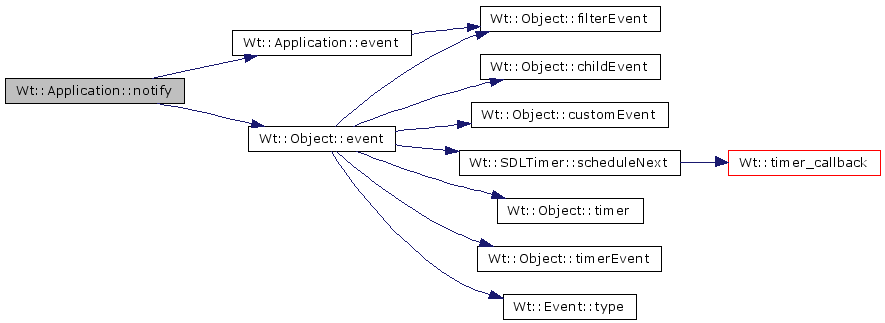
| Object* Wt::Object::parent | ( | ) | const [inline, inherited] |
Definition at line 53 of file object.h.
References Wt::Object::parent_.
Referenced by Wt::Widget::event(), Wt::Widget::focusNextPrevChild(), Wt::Window::Frame::Frame(), Wt::Widget::is_hidden(), Wt::Object::isDescendant(), Wt::Layout::isTopLevel(), Wt::Layout::Layout(), Wt::Widget::lower(), Wt::Layout::mainWidget(), Wt::operator<<(), Wt::Widget::paintEvent(), Wt::Widget::parentWidget(), postEvent(), Wt::Widget::raise(), Wt::Widget::updateGeometry(), Wt::Widget::Widget(), Wt::Window::Window(), Wt::Layout::~Layout(), and Wt::Widget::~Widget().
00053 { 00054 return parent_; 00055 };
| void Wt::Application::parseArgs | ( | int | argc, | |
| char ** | argv | |||
| ) | [protected] |
Definition at line 99 of file application.cpp.
References argv_, depth_, Wt::SDL::enableDebug(), enableTrace, height_, Wt::Object::name(), quit(), trace, and width_.
Referenced by Application().
00099 { 00100 enum { 00101 TRACE, XSYNC, WT_WIDTH, WT_HEIGHT, WT_DEPTH, WT_HELP, HELP 00102 }; 00103 00104 class Option { 00105 public: 00106 Option(const std::string& name, const std::string& help) 00107 : name(name), 00108 help(help) {} 00109 std::string name; 00110 std::string help; 00111 }; 00112 00113 Option options[] = { 00114 Option("--wt-trace=", "enables tracing for a comma separated list of subsystems"), 00115 Option("--wt-xsync", "enables X sync to help debugging"), 00116 Option("--wt-width=", "the preffered width of the application"), 00117 Option("--wt-height=", "the preffered height of the application"), 00118 Option("--wt-depth=", "the preffered color depth of the application"), 00119 Option("--wt-help", "display this help and quits"), 00120 Option("--help", "display this help and quits") 00121 }; 00122 00123 const int numopts = sizeof(options) / sizeof(options[0]); 00124 00125 for (int i = 0; i < argc; i++) { 00126 std::string s = argv[i]; 00127 if (s.find(options[TRACE].name) == 0) { 00128 std::string rest = std::string(s, options[TRACE].name.length()); 00129 do { 00130 //look for comma 00131 std::string channel; 00132 int comma_index = rest.find(","); 00133 if (comma_index > 0) { 00134 channel = std::string(rest, 0, comma_index); 00135 rest = std::string(rest, comma_index + 1); 00136 enableTrace(channel); 00137 } else if (comma_index < 0) { 00138 channel = std::string(rest, 0); 00139 rest = ""; 00140 enableTrace(channel); 00141 } else { 00142 // == 0 00143 rest = std::string(rest, comma_index + 1); 00144 } 00145 } while(rest.length()); 00146 } else if (s.find(options[XSYNC].name) == 0) { 00147 trace("app", "Enabling X-sync for debugging\n"); 00148 SDL::enableDebug(); 00149 } else if (s.find(options[WT_WIDTH].name) == 0) { 00150 width_ = boost::lexical_cast<int>(std::string(s, options[WT_WIDTH].name.length())); 00151 } else if (s.find(options[WT_HEIGHT].name) == 0) { 00152 height_ = boost::lexical_cast<int>(std::string(s, options[WT_HEIGHT].name.length())); 00153 } else if (s.find(options[WT_DEPTH].name) == 0) { 00154 depth_ = boost::lexical_cast<int>(std::string(s, options[WT_DEPTH].name.length())); 00155 } else if (s.find(options[WT_HELP].name) == 0 || 00156 s.find(options[HELP].name) == 0) { 00157 std::cout << "Standard wt options are:\n"; 00158 for (int j = 0; j < numopts; j++) { 00159 std::cout << "\t" << options[j].name << 00160 "\t" << options[j].help << std::endl; 00161 } 00162 quit(); 00163 } else { 00164 argv_.push_back(s); 00165 } 00166 } 00167 }
Here is the call graph for this function:

Definition at line 339 of file application.cpp.
References Wt::Event::ChildInserted, Wt::Event::ChildRemoved, Wt::Application::EventQueueItem::event, Wt::Object::event(), event(), Wt::Singleton< DERIVED >::existingInstance(), Wt::Region::isEmpty(), Wt::Event::LayoutHint, Wt::Widget::mapToParent(), Wt::Event::Move, Wt::Event::Paint, Wt::Object::parent(), queue, Wt::Application::EventQueueItem::receiver, Wt::PaintEvent::region(), Wt::Event::Resize, sendEvent(), trace, and Wt::Widget::update().
Referenced by Wt::SDLInput::handleActiveEvent(), Wt::SDLInput::handleKeyEvent(), Wt::SDLInput::handleMouseEvent(), Wt::SDLTimer::handleTimerEvent(), Wt::Widget::hiddenChanged(), Wt::Object::insertChild(), Wt::Widget::move(), Wt::Layout::postLayoutHintEvent(), Wt::postLayoutHintEventRecursively(), Wt::Object::removeChild(), Wt::Widget::resize(), Wt::Widget::setFocus(), Wt::Widget::setLayout(), Wt::Widget::update(), Wt::Widget::updateGeometry(), and Wt::Object::~Object().
00339 { 00340 Application *app = existingInstance(); 00341 if (!app) { 00342 sendEvent(receiver, *event); 00343 delete event; 00344 return; 00345 } 00346 EventQueueList& queue = app->queue; 00347 EventQueueItem new_item(receiver, event); 00348 int type = event->type(); 00349 00350 trace("event") << "Posting " << event 00351 << " for " << receiver << std::endl; 00352 00353 // obvious optimization: eliminate unnedded/unprocessed/overwritten events 00354 // let only the last one suvive for move, size, layouthint 00355 // aggregate paint 00356 // also eliminate child events when they are followed by destruction 00357 switch (type) { 00358 case Event::ChildRemoved: { 00359 Object *dead_obj = (static_cast<ChildEvent *>(event))->child(); 00360 for (EventQueueList::iterator I(queue.begin()), 00361 E(queue.end()); I != E;) { 00362 const EventQueueItem& item = *I; 00363 if ((item.receiver == new_item.receiver && 00364 item.event->type() == Event::ChildInserted) || 00365 item.receiver == dead_obj) { 00366 trace("event") << "Eliminating " << item.event << 00367 " for " << static_cast<void *>(item.receiver) << std::endl; 00368 delete item.event; 00369 I = queue.erase(I); 00370 } else { 00371 ++I; 00372 } 00373 } 00374 // we are not going to deliver this sucker 00375 if (!receiver) { 00376 delete event; 00377 return; 00378 } 00379 } 00380 break; 00381 case Event::Paint: { 00382 Region region; 00383 00384 for (EventQueueList::iterator I(queue.begin()), 00385 E(queue.end()); I != E;) { 00386 const EventQueueItem& item = *I; 00387 if(item == new_item) { 00388 PaintEvent *paint_e; 00389 if (region.isEmpty()) { 00390 paint_e = static_cast<PaintEvent *>(new_item.event); 00391 region = paint_e->region(); 00392 } 00393 // aggregate paint events 00394 paint_e = static_cast<PaintEvent *>(item.event); 00395 trace("event") << "Before Aggregation: " << region; 00396 region |= paint_e->region(); 00397 trace("event") << "Aggregate: " << paint_e->region(); 00398 trace("event") << "After Aggregation: " << region; 00399 trace("event") << "Eliminating " 00400 << item.event << " " << static_cast<void *>(item.event) 00401 << " for " << receiver << std::endl; 00402 delete item.event; 00403 I = queue.erase(I); 00404 } else { 00405 ++I; 00406 } 00407 } 00408 00409 if (!region.isEmpty()) { 00410 bool erased = static_cast<PaintEvent *>(new_item.event)->erased(); 00411 delete new_item.event; 00412 // clip to parent if exists 00413 Widget *w = static_cast<Widget *>(new_item.receiver); 00414 Widget *wp = static_cast<Widget *>(w->parent()); 00415 if (wp) { 00416 Widget::update(wp, w->mapToParent(region)); 00417 } 00418 new_item.event = new PaintEvent(region, erased); 00419 } 00420 00421 } 00422 break; 00423 case Event::Resize: 00424 case Event::Move: 00425 case Event::LayoutHint: 00426 for (EventQueueList::iterator I(queue.begin()), 00427 E(queue.end()); I != E;) { 00428 const EventQueueItem& item = *I; 00429 if(item == new_item) { 00430 trace("event") << "Eliminating " << item.event << " for " << receiver << std::endl; 00431 delete item.event; 00432 I = queue.erase(I); 00433 } else { 00434 ++I; 00435 } 00436 } 00437 break; 00438 default: 00439 break; 00440 } 00441 00442 queue.push_back(new_item); 00443 }
Here is the call graph for this function:
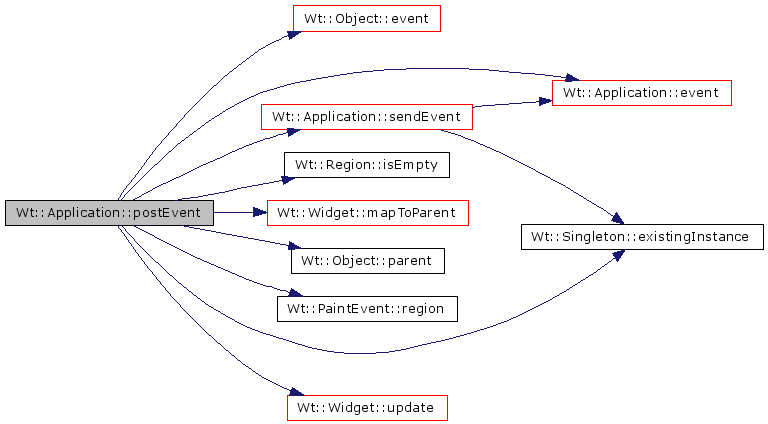
| void Wt::Application::processEvent | ( | ) |
process on event event if we have to wait for it
Definition at line 239 of file application.cpp.
References processEvents().
00239 { 00240 SingleShot c; 00241 processEvents(&c); 00242 }
Here is the call graph for this function:

| void Wt::Application::processEvents | ( | const bool & | var | ) |
process all events while the var is true
Definition at line 278 of file application.cpp.
References processEvents().
00278 { 00279 VarBlock v(var); 00280 processEvents(&v); 00281 }
Here is the call graph for this function:

| void Wt::Application::processEvents | ( | int | ms = 3000 |
) |
process all the events in the queue for a maximum period of time
Definition at line 260 of file application.cpp.
References processEvents().
00260 { 00261 TimerBlock t(ms); 00262 processEvents(&t); 00263 }
Here is the call graph for this function:

| void Wt::Application::processEvents | ( | Condition * | cond | ) |
process all events until the condition is met
Definition at line 211 of file application.cpp.
References condition_stack, queue, sendPostedEvents(), and Wt::SDLEvent::wait().
Referenced by exec(), processEvent(), and processEvents().
00211 { 00212 condition_stack.push(cond); 00213 while (!(*cond)()) { 00214 if (queue.empty()) 00215 SDLEvent::wait(); 00216 sendPostedEvents(); 00217 } 00218 condition_stack.pop(); 00219 }
Here is the call graph for this function:

| void Wt::Application::quit | ( | ) |
Halt execution and close window.
Reimplemented from Wt::Singleton< DERIVED >.
Definition at line 299 of file application.cpp.
References exit().
Referenced by parseArgs().
00299 { 00300 Application::exit(0); 00301 }
Here is the call graph for this function:

| void Wt::Object::removeChild | ( | Object * | obj | ) | [virtual, inherited] |
Definition at line 88 of file object.cpp.
References Wt::Event::ChildRemoved, Wt::Object::children_, Wt::Object::parent_, and postEvent().
Referenced by Wt::Object::reparent(), and Wt::Object::~Object().
00088 { 00089 List::iterator end = children_.end(); 00090 List::iterator p = find(children_.begin(), end, obj); 00091 00092 if (p != end) { 00093 children_.erase(p); 00094 obj->parent_ = 0; 00095 Event *child_event = new ChildEvent(Event::ChildRemoved, obj); 00096 Application::postEvent(this, child_event); 00097 } 00098 }
Here is the call graph for this function:
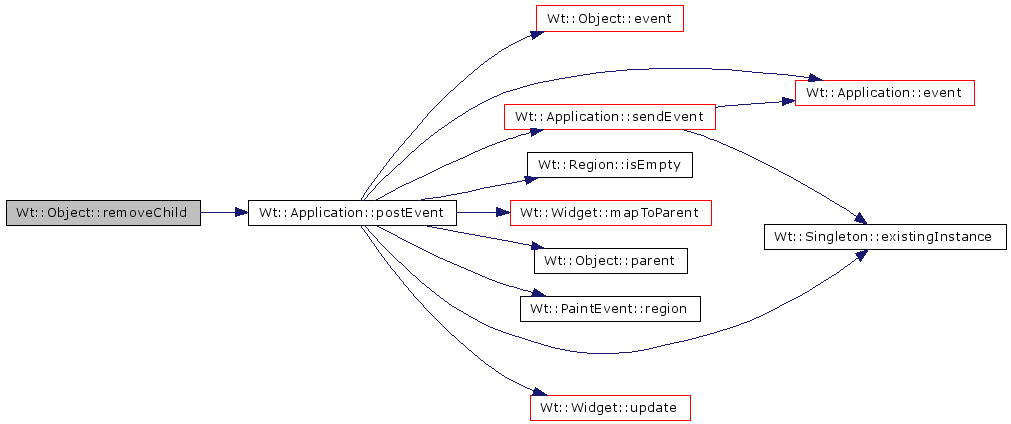
| void Wt::Object::removeEventFilter | ( | const Object * | obj | ) | [inherited] |
Definition at line 132 of file object.cpp.
References Wt::Object::eventFilters_.
Referenced by Wt::Object::installEventFilter().
00132 { 00133 List::iterator p, end(eventFilters_.end()); 00134 p = find(eventFilters_.begin(), end, obj); 00135 if (p != end) 00136 eventFilters_.erase(p); 00137 }
| void Wt::Object::reparent | ( | Object * | new_parent | ) | [inherited] |
Definition at line 100 of file object.cpp.
References Wt::Object::insertChild(), Wt::Object::parent_, Wt::Object::removeChild(), and trace.
Referenced by Wt::Layout::addItem(), Wt::Widget::reparent(), and Wt::Widget::setLayout().
00100 { 00101 if (parent_ == new_parent) 00102 return; 00103 trace("obj") << "Reparenting " << this << std::endl; 00104 00105 if (parent_) { 00106 trace("obj") << " Leaving parent " << parent_ << std::endl; 00107 parent_->removeChild(this); 00108 } 00109 if (new_parent) { 00110 trace("obj") << " Going to new parent " << new_parent << std::endl; 00111 new_parent->insertChild(this); 00112 } 00113 parent_ = new_parent; 00114 }
Here is the call graph for this function:

Definition at line 330 of file application.cpp.
References event(), Wt::Singleton< DERIVED >::existingInstance(), and notify().
Referenced by Wt::Widget::close(), Wt::Widget::event(), postEvent(), Wt::Widget::repaint(), and sendPostedEvents().
00330 { 00331 Application *app = existingInstance(); 00332 if (app) 00333 return app->notify(receiver, &event); 00334 else if (receiver) 00335 return receiver->event(&event); 00336 return 0; 00337 }
Here is the call graph for this function:

| void Wt::Application::sendPostedEvents | ( | ) | [static] |
process the already posted events -- empties the queue
Definition at line 195 of file application.cpp.
References Wt::Singleton< DERIVED >::existingInstance(), queue, sendEvent(), and trace.
Referenced by exec(), Wt::Layout::Layout(), processEvents(), Wt::Widget::Widget(), Wt::Window::Window(), and Wt::Object::~Object().
00195 { 00196 Application *app = existingInstance(); 00197 if (!app) 00198 return; 00199 EventQueueList& queue = app->queue; 00200 while (!queue.empty()) { 00201 const EventQueueItem item = queue.front(); 00202 Object *receiver = item.receiver; 00203 Event *e = item.event; 00204 queue.pop_front(); 00205 trace("event") << "Handling " << e << std::endl; 00206 sendEvent(receiver, *e); 00207 delete e; 00208 } 00209 }
Here is the call graph for this function:

Definition at line 139 of file object.cpp.
References Wt::Object::timers_.
Referenced by Wt::Timer::start().
00139 { 00140 int id = timers_.size() + 1; 00141 timers_[id] = new SDLTimer(this, id, interval); 00142 return id; 00143 }
| virtual void Wt::Object::timerEvent | ( | TimerEvent * | ) | [inline, protected, virtual, inherited] |
Reimplemented in Wt::Timer.
Definition at line 148 of file object.h.
Referenced by Wt::Object::event(), and Wt::Timer::timerEvent().
| Object * Wt::Object::topParent | ( | ) | const [inherited] |
returns top level parent: it may return itself
Definition at line 116 of file object.cpp.
References Wt::Object::parent_.
Referenced by Wt::Widget::topParentWidget().
00116 { 00117 const Object *p = this; 00118 while (p->parent_) { 00119 p = p->parent_; 00120 } 00121 return const_cast<Object *>(p); 00122 }
friend class Singleton< Application > [friend] |
Definition at line 42 of file application.h.
| sigc::signal<void> Wt::Application::aboutToQuit |
std::list<std::string> Wt::Application::argv_ [private] |
int Wt::Application::depth_ [private] |
Signal01<void, const Object *> Wt::Object::destroyed [inherited] |
signals
Definition at line 139 of file object.h.
Referenced by Wt::Layout::addItem(), Wt::Object::installEventFilter(), and Wt::Object::~Object().
int Wt::Application::exitcode_ [private] |
int Wt::Application::height_ [private] |
DERIVED * Wt::Singleton< DERIVED >::instance_ = 0 [static, protected, inherited] |
Definition at line 91 of file singleton.h.
Referenced by Wt::Singleton< Wt::Audio >::existingInstance(), Wt::Singleton< Wt::Audio >::instance(), Wt::Singleton< Wt::Audio >::load(), Wt::SDLDisplay::load(), Wt::Audio::load(), Wt::Singleton< Wt::Audio >::Singleton(), and Wt::Singleton< Wt::Audio >::~Singleton().
EventQueueList Wt::Application::queue [private] |
Definition at line 111 of file application.h.
Referenced by postEvent(), processEvents(), and sendPostedEvents().
bool Wt::Application::running_ [private] |
int Wt::Application::width_ [private] |
This document is licensed under the terms of the GNU Free Documentation License and may be freely distributed under the conditions given by this license.